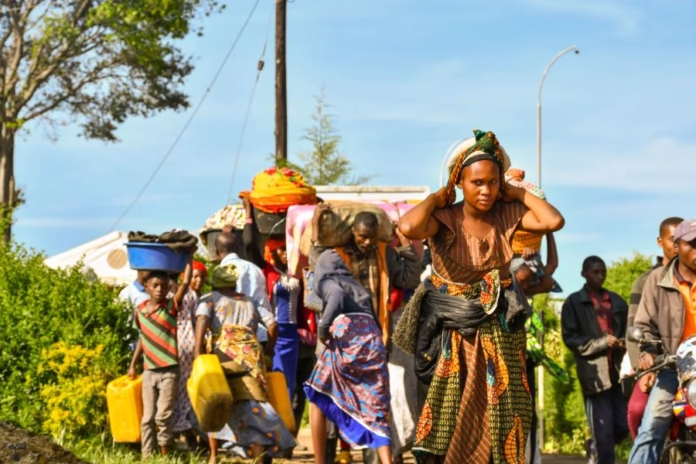The United Nations peacekeeping mission in the Democratic Republic of Congo (MONUSCO) continues to offer protection to vulnerable populations, despite mounting challenges from escalating hostilities in the mineral-rich region of North Kivu.
Vivian van de Perre, deputy head of MONUSCO, briefed journalists from Goma, the regional capital, on the ongoing crisis, emphasizing that the situation remains volatile, with the risk of further escalation.
“Military action alone will not resolve this conflict,” she warned.
The conflict in eastern DR Congo, marked by an increase in armed groups, has displaced hundreds of thousands of people, forcing many into displacement camps in search of safety. Fighting intensified sharply in late January, as the largely Tutsi M23 rebels seized key areas of North Kivu, including parts of Goma, and advanced toward South Kivu and Bukavu, the region’s second-largest city.
MONUSCO is operating in a difficult environment, with its key infrastructures in Goma overwhelmed, and space and resources stretched thin. “Some 2,000 people—both UN personnel and Congolese civilians—are sheltering within our premises,” said van de Perre. The pressure on essential resources, including water, food, and sanitation, is growing.
Goma airport, a critical entry point for humanitarian aid, remains under M23 control after the rebels seized it last week.
Significant damage has been reported at the airport, including to the control tower, and UN personnel have been denied access. MONUSCO has also expressed grave concern over the potential takeover of Kavumu airport, warning that losing both airports amid the ongoing humanitarian crisis would be disastrous for the region.
Although water and electricity services have been partially restored in Goma, much more is needed to ensure adequate services for the population. The World Health Organization (WHO) has raised alarms about potential disease outbreaks, as the bodies of over 2,000 people have already been buried, with 900 still in morgues, raising fears of an epidemic.
While the UN continues to advocate for peace talks, efforts have stalled.
The two main diplomatic initiatives—the Luanda and Nairobi processes—have failed to produce tangible results. The upcoming African Union summit later this month is seen as a key opportunity to revive regional engagement.
Van de Perre confirmed the presence of Rwandan forces in eastern DR Congo, despite denials from the Rwandan government. The UN mission has restricted movement in the area, limiting verification capabilities, but reports have pointed to Rwandan military involvement alongside M23 fighters.
Amid the growing insecurity, MONUSCO has ceased joint operations with Congolese forces (FARDC) and withdrawn from South Kivu, in line with Security Council mandates. The mission is now awaiting further instructions, as discussions on the next steps are expected in the coming days. Van de Perre stressed the need for “clear guidance” from the UN Security Council, as the situation continues to evolve rapidly.
Adding to the humanitarian crisis, the U.S. government’s decision to halt USAID funding for certain programs is expected to disrupt UN relief efforts. The International Organization for Migration (IOM) and other key UN agencies have already been affected by stop-work orders, exacerbating the crisis.
Reports also indicate that M23 has ordered NGOs to halt operations in areas under their control, further limiting humanitarian access.
“We urgently call for the reopening of Goma airport,” said UN spokesperson Stéphane Dujarric. “We need to evacuate the wounded and bring in critical humanitarian supplies and staff.”
As MONUSCO continues its efforts to protect civilians, de-escalate hostilities, and facilitate humanitarian aid, van de Perre emphasized the need for a political solution. “The people of the DRC deserve peace, security, and stability,” she said, urging all parties to end the fighting, prioritize dialogue, and work toward a peaceful resolution.
The United Nations peacekeeping mission in the DRC, MONUSCO, has been in the country since 1999, working to protect civilians and support stability in a region plagued by violence from armed groups. The DRC’s eastern provinces, including North Kivu and South Kivu, have been a focal point for such conflict, especially due to the presence of valuable natural resources.



